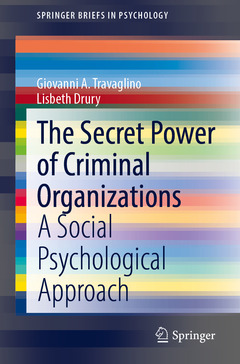Description
The Secret Power of Criminal Organizations, 1st ed. 2020
A Social Psychological Approach
SpringerBriefs in Psychology Series
Authors: Travaglino Giovanni A., Drury Lisbeth
Language: English
Subject for The Secret Power of Criminal Organizations:
Approximative price 52.74 €
In Print (Delivery period: 15 days).
Add to cart66 p. · 15.5x23.5 cm · Paperback
Description
/li>Contents
/li>Biography
/li>Comment
/li>
Introduction: Criminal Organisations and the Community.- Intracultural Appropriation Theory and Omertà.- Honour, Masculinity and Organised Crime.- Identity and Social Change.- Intergroup contact, Culture and Criminal Groups.- Criminal Organisations, Social Banditry and Political Behaviour.- Conclusions: Towards a Social Psychology of Organised Crime.
Giovanni A. Travaglino, PhD, is an Assistant Professor in Applied Psychology at the Chinese University of Hong Kong (Shenzhen), and Lecturer in Social and Organizational Psychology at CSGP, School of Psychology, University of Kent. His research focuses on resistance to criminal organisations and, more broadly, on group processes and inter-group relations in different cultural contexts. He is co-editor with Benjamin Abrams of Contention: The Multidisciplinary Journal of Social Protest and founder of the Interdisciplinary Network for Social Protest Research.
Lisbeth Drury, PhD, is a Lecturer in Organizational Psychology at Birkbeck, University of London. Her research examines on the impact and antecedents of inter-group relations across a range of public, private and organizational settings. She is a consulting editor for the journal Group Processes and Intergroup Relations.
Presents a new perspective on organized crime and other extreme and criminal groups
Evidence based view of community interactions with criminal organizations
Brings together viewpoints from sociology, anthropology, political science and psychology
Highlights cultural values as a key factor in communities’ interaction with criminal groups



